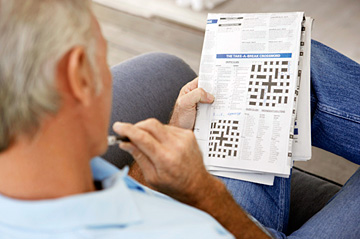Recent studies have found that today's youth are struggling with cognitive thinking due to a lack of physical activities and games. I'm not referring to dominant-sided organized sports such as baseball or football, but instead to games like dodgeball and tag.
These games require the child to involve three-dimensional space and demand the use of binocular vision beyond arm's length.
Teens and Adults: Enjoyable Brain Games and Their Benefits
As children move into their teens, the higher demand of their studies may be beneficial brain exercise. However, since teens tend to do what they want, they will be more likely to engage in something they enjoy. Even adults will generally find themselves more willing to participate in something fun, rather than something that is just beneficial.
Sudoku, the popular puzzle game, is a perfect brain game in this regard, as it requires discerning, deciphering and decoding while still being challenging and compelling. Equally beneficial, while still entertaining, are crossword and jigsaw puzzles, although these may not be as amusing to today's youth.
Going to the gym is another activity you can challenge the teen with. If you have a gym membership, get your teens to join in on classes that focus on circuit training, yoga, rock climbing or dance.
Video Games
Recognizing that teens and adults are fascinated and challenged by IQ tests and trivia questions, Nintendo DS and Wii have released several video games in this genre. Brain games that will require testing, knowledge and memory, and are also fun, include (for DS): Big Brain Academy, Brain Age, Brain Age 2, Ultimate Brain Age and Master Jin Jin's IQ Challenge. For the Wii, Nintendo has created Big Brain Academy, Margot's Word Brain and Brain Challenge.
Exercise With Strategy
Some of the best brain games continue to be those that have been around for years, the most obvious being chess. Requiring players to strategize, consider their moves two or three in advance, and trying to speculate what moves their opponent will make, makes chess perhaps the most beneficial of all brain exercises. However, this doesn't mean you should rule out checkers or card games. Any game that requires strategizing and decision-making regarding the potential results of a certain move will give the brain an excellent workout.
Senior Brain Health
 It's not unusual for seniors to state that it's easier for them to remember something from 50 years ago than from yesterday. Growing awareness about brain degenerative diseases has people in their early 50s starting to become more proactive. This may be why companies like AARP and MetLife are beginning to focus on the importance of brain health.
It's not unusual for seniors to state that it's easier for them to remember something from 50 years ago than from yesterday. Growing awareness about brain degenerative diseases has people in their early 50s starting to become more proactive. This may be why companies like AARP and MetLife are beginning to focus on the importance of brain health.
Research published in the Journal of Neuroscience in 2008 revealed that if a neuron doesn't receive sufficient stimulation through active synapses, it will eventually die. On the other hand, if it receives stimulation from other neurons developing along the same neural pathway, it lives and grows. It's this simple.
Crossword and jigsaw puzzles, Sudoku and reading the newspaper are just the beginning of ways to exercise neurons and synapses. Fun challenges or neurobics can be equally, if not more beneficial. For instance, wearing a wrist watch on the other arm, brushing your teeth with the opposite hand or wearing a blindfold at home for an hour; these games or mental exercises all stimulate the brain by causing it to do mundane activities differently.
Remember, the brain is just like every other muscle or organ in your body: if you don't use it, then it won't perform at its peak. At any age, our brains can benefit from mental exercise. That's why it's important to explore the various ways you can maintain a healthy brain throughout your lifetime. Talk to your doctor of chiropractic for additional information.
Claudia Anrig, DC, practices in Fresno, Calif., and is on the board of directors of the International Chiropractic Pediatric Association, an organization that can answer your questions regarding the value of chiropractic care during and after pregnancy.

